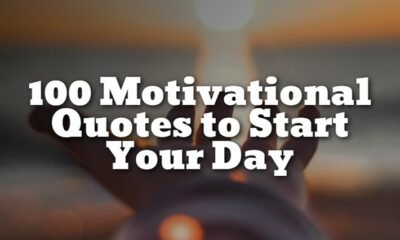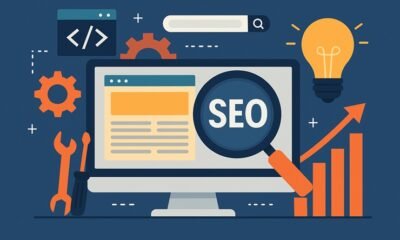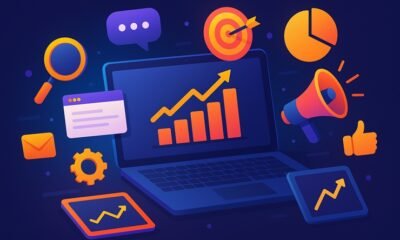Business
Adapting Your Business to More Modernized HR Processes

Image by Freepik
In the past, HR teams were viewed as a highly administrative department. They were solely responsible for processing payroll, administering employee benefits, and tackling hiring and onboarding responsibilities.
While these tasks are still an important part of human resources, there has been a significant push over the years to modernize the approach for how they’re executed. Successful businesses today leverage a wide range of tools and solutions that help them carry out important company initiatives while also focusing on creating more engaged workforces.
By adapting your organization to this new norm, you can transform your HR team into a powerful business enabler. Below are some key ways this can be accomplished.
Redefining the Employee Experience
Creating Welcoming Onboarding Processes
The first step in building successful employer-employee relationships is to create a welcoming onboarding process. This is what helps a new employee ground themselves quickly and efficiently in a new working environment while making it easier to adapt to the company culture.
To help achieve this, modern HR teams are moving past traditional training processes and focusing on creating a much more interactive, digital experience for their new employees. Making investments in various supporting HR technologies helps teams automate tasks such as document signing or benefits enrollment.
This automation not only makes it easier for HR teams to carry out their tasks, but it also creates a much more seamless onboarding experience with fewer administrative errors and more progressive training activities. With this added support, new team members are able to pick things up much more quickly and feel much more confident as they move forward.
Empowering Teams With Continuous Development Opportunities
Another important element of modern HR strategies is to help leadership teams provide their employees with helpful learning paths for each of their employees. By taking this approach, it helps to support the organization’s goal of creating a culture of continuous growth.
Instead of creating a one-size-fits-all training program for new and current employees, businesses can leverage different HR platforms to offer more personalized training options based on the needs of each individual. HR teams can utilize automated technologies to build out custom performance objectives that take into consideration an employee’s current role, skillset, and past working experiences.
When HR teams can create more custom-tailored development opportunities for their employees, it shows a willingness on behalf of the organization to invest in their teams. This provides a win-win situation, where the employee can gain valuable skill sets they can use throughout their career, while the businesses can leverage their new capabilities for future advancements in the company.
Streamlining Operations with Innovative HR Tech
Making Use of Integrated BenAdmin Platforms
If all employee data is scattered across multiple systems, it creates a lot of additional work for HR teams to manage it all. Having an integrated BenAdmin platform takes away the additional workloads associated with HR-related tasks and creates a much more efficient system for managing sensitive employee information.
Best of breed BenAdmin platforms act as a single source of truth when needing to consolidate all employee information in one place. They can create seamless connectivity between payroll systems, benefits providers, and other supporting HR systems. With all of these platforms sharing data connections, it eliminates the need for manual data entry across multiple locations and lets HR teams focus more on other strategic business initiatives, such as finalizing ACA reporting or evaluating new benefits providers.
Improving Information Accessibility with Self-Service Tools
If employees are able to self-serve many of their questions or issues, it not only helps them stay focused on their work but also frees up HR teams from needing to answer time-consuming questions regarding benefits administration, vacation time allotments, and other staff inquiries.
Modern HR platforms can give your teams direct access to their own data, such as their pay stub information, benefits details, and personal employee information. This accessibility lets them execute various tasks on their own, such as updating their personal details or getting detailed information on their benefits options.
These types of platforms are also a perfect solution for centralizing company policies, departmental procedures, and various FAQ pages. With all this information readily accessible, it can create a much more transparent environment that reduces the need for submitting support tickets or answering time-sensitive questions.
Building a Culture of Openness
Bridging Information Gaps With Impactful Communication Strategies
If a business only applies a top-down communication strategy with employees, it can present a potential problem when trying to create a more unified company culture. Today, modern HR teams are actively looking for ways to keep their employees in important business discussions by creating more channels for them to be part of the conversation.
Leveraging tools like anonymous surveys isn’t just an effective way to help employees feel heard, but they can also provide powerful feedback loops that help businesses make better decisions for everyone.
When opening up discussions to a larger group of employees, it’s important to be open and honest regarding the reasoning behind certain directions. Instead of just pushing employees down a certain path, it’s critical for business leaders to open up and explain why these decisions are being made and the benefits they’ll provide.
Creating a Sense of Belonging
When employees feel like the business wants and needs them there, it helps them feel a sense of belonging. This is critical to help ensure long-term staff retention.
To create this type of working culture, everyone should feel like their voice matters and that their ideas are valued. Regularly acknowledging employee contributions is an effective way of achieving this and shows that even smaller contributions are noticed and appreciated.
Other things, such as offering more flexible working arrangements or providing more comprehensive employee benefits, are other ways to show teams that you care about their well-being in and out of the workplace.
Modernize Your HR Processes
When you create a supportive and efficient experience for every employee, starting from their very first day, you’re building an enjoyable and resistant company culture. This not only improves staff retention but also helps your business to grow more sustainably over time.
-

 Quotes3 years ago
Quotes3 years ago53 Motivational Gym Quotes to Fuel Your Workout
-

 Motivation5 years ago
Motivation5 years ago4 Fun New Hobbies To Try This Year
-

 Quotes10 years ago
Quotes10 years ago50 Most Powerful Quotes Ever Spoken
-

 Quotes2 months ago
Quotes2 months ago100 Motivational Quotes to Inspire You in 2026
-

 Quotes2 years ago
Quotes2 years ago43 Inspirational Quotes About Thoughts
-

 Quotes3 years ago
Quotes3 years ago105 Motivational Quotes by Famous People
-

 Quotes7 months ago
Quotes7 months ago100 Motivational Quotes to Start Your Day with Positivity
-

 Education1 year ago
Education1 year agoHow to Motivate Yourself to Study: 6 Proven Techniques































